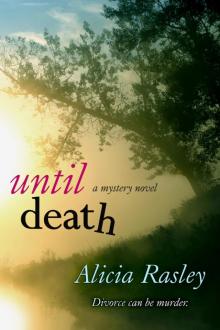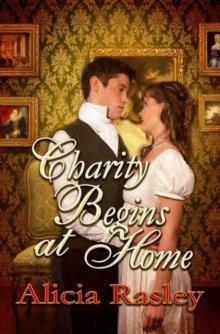- Home
- Alicia Rasley
Poetic Justice, a Traditional Regency Romance (Regency Escapades) Page 2
Poetic Justice, a Traditional Regency Romance (Regency Escapades) Read online
Page 2
The dirt road ended at the quay, no more than an old pier with a few fishing sheds drooping over the water. Over the suddenly loud clatter of his horse's hooves on wood, John heard something, something stealthy, the scrape of metal blade from metal sheath, the slide of a boot over wood. His hand found his own blade, gripped it surely, drew it out. He scanned the dock ahead, half-hidden now in dusk's shadows, and urged Malta into a gallop.
There was a guttural Greek shout, forms catapulting from behind a shed, the flash of metal reflecting the last sun rays, a slash against his boot, across the leather bag under his knee. John let the reins drop, grabbed the bag with one hand, slashed up with the other. One of the attackers dropped screaming, blood spurting from his arm, but two others leaped up as John dug his heels into Malta's side and she sprang away.
One bandit got hold of John's leg and hung on, and he felt Malta slide out from under him. The fall to the dock seemed to take forever. Malta was halfway to the sloop's mooring before John, curled protectively around the saddlebag, landed against the rough wood and the rough wool of the bandit's shirt. He glimpsed the other bandit leaping, blade held high. John kicked upward, slashed indiscriminately, all dervish motion and deadly intent, his boot heel jamming against the bandit's chin, his knife ripping through cloth and flesh, heat coursing through him, infusing his muscles with liquid energy. Ah, this I remember, this I am; I have not lost myself after all.
He had fought off attackers on other docks, and on the docks of other ships on other seas, and he knew just what to do. He sprang up into a half-crouch, his blade arcing, forcing his enemies away. It was no time for subtlety, for graceful thrust and parry. This was pure demonic combat, an anarchy of blades and bodies. His true element.
By the time his shipmates arrived panting, daggers drawn, the light was gone entirely and the dock was slippery with blood. Two of the bandits had fled, and the third lay unconscious on the dock. John loosed his death grip on the saddlebag, let his first mate take it, let his steward peel his fingers from around the knife and put it away. He nudged the bandit with his foot. "Tell your employer," he said, then paused to drag in a breath, "that I passed that test too."
CHAPTER TWO
May 25, 1818
Sir, he hath never fed of the dainties that are bred in a book.
He hath not eat paper, as it were; he hath not drunk ink.
Love's Labor Lost IV, ii.
I have spent most of my life like this, Jessica Seton thought, sitting here on this settee, waiting for two men to determine the rest of my life. It was an exaggeration, of course, if a forgivable one. Long ago she had waited here in the hallway while a solicitor read her father's will to her uncle, and three years ago when a colonel from the Horse Guards came with news from Waterloo.
Now another afternoon of anxiety and dread. Impatient suddenly, she slipped off her shoes and in her stockinged feet crossed to the door that shut her out of her uncle's study. She rested her temple against the cool wood and held her breath. She could hear nothing but a low rumble of voices. Consigning convention to perdition, she reached for the knob. But it turned under her fingers, and she stepped back quickly as Damien Blake emerged.
She could tell from his brooding face that his suit, like the others, had been unsuccessful. She grabbed his hand and pulled him into the drawing room, closing the door behind her and leaning back on it, near despair. "He said no, didn't he?"
Damien was a poet, and measured his words for sound and sense before he spoke them. "That is so." Two beats, and then rest of the line. "He will not give his consent."
"Did he tell you why?"
Damien inclined his head to the side, considered this. He was a radical also, and so etched irony into his next verse. "A man granted such authority need have no reason to use it."
Jessica closed her eyes for a moment and gathered her tattered temper back together. "Did you try to persuade him?"
"Persuade him?" The radical vanished, and the marquess's son regained control of Damien's features. "Certainly not."
"Damien, oh, what did you say, then, if you didn't try to change his mind?"
Suddenly he swept her into his arms, protective and ardent at once. "I told him that true love needed no consent, and we would marry without it."
"You didn't really say that," One look up at his proud noble face told her he did. She wrenched herself free of him. "Oh, Damien, this isn't Romeo and Juliet! We can't marry without his consent."
Damien withdrew sulkily to the couch, assuming a picturesque pose with head back and arms flung out. In the dusty sunlight he shone like an Elgin Marble. "You are of age. I am of age. We can marry tomorrow, if we desire. No man can gainsay us."
"That man can gainsay my inheritance. Damien, if you would just have tried to convince him that you care enough—"
"It should be self-evident."
That this was true did not make it right. She halted her pacing in front of the couch and regarded him with exasperation. "Probably my uncle thinks that the perfect suitor would argue his case."
"Probably," Damien suggested, ironic again, "he thinks no one is the perfect suitor. No one yet living, that is." He reached out his hand to hers, and drew her to sit beside him. "As far as your uncle is concerned, you were meant to marry his son. His son's best friend is no substitute. And neither, I wager, is anyone else."
As he spoke this home truth, he regarded her sympathetically and opened his arms in invitation. But with her uncle just across the hall, she didn't take advantage of this to seek comfort, instead rising again to pace, her stockinged feet sliding across the oak floor. Comfort wasn't what she wanted, at any rate. She wanted control. Control over her life, her fate, her inheritance.
"It isn't fair."
"What isn't fair is that you deny yourself to suit him."
"I am not denying myself to suit him. It is in my father's will, that I must marry with his consent, or lose my inheritance."
"Jessica, what is it you want, me or the inheritance?"
It was too obvious to say aloud. But Damien was waiting, sitting up, leaning forward, as if he didn't know the answer.
"Both."
"Both? Both? Equally?"
No, she almost said. It was not the answer he wanted. But it was the only one she had. And, she thought with renewed anger, he should accept that. "I have lived all my life thinking—knowing—that I was to have the Parham Collection. I am not going to give it up, not while I still have a chance."
"And if you marry me now, without your uncle's consent, you will lose it forever."
Relieved that he understood, she nodded.
But Damien was Damien, and she should have known that whatever else he understood, it wasn't the value of the Parham Collection. "Well, love is worth the sacrifice of it, I think. And you should think so too."
A sacrifice for love. It was a poetic sentiment, and with half her heart she longed for the sort of man who made it. The other half, however, was reserved for the collection her parents had left her, or would have left her, had they known how much she would sacrifice for it.
Damien observed her stubborn silence for a moment, then rose, his jaw taut but his hand open and extended towards her. "I can promise you a pleasant, worthy life, in recompense for giving up the collection. You won't have the old books, but you will be my helpmeet as I write new books." When she only frowned and looked at his hand, he withdrew it and bowed. "I shan't try to persuade you, but my offer remains open. If you decide you want to marry me, you may send a note to my lodge in the Cotswolds. I am preparing a book of pastorals, and need more of nature than I find here in London."
As he departed, Jessica considered suggesting that he might sacrifice his communing with nature to help her change her uncle's mind. But she knew she wouldn't be able to strip the sarcasm from her voice. Indeed, even the careful "Do have a good holiday" she called after him fairly dripped with irony.
She watched over the staircase till Damien was almost out the door, and then call
ed after him, "I hope the flies are biting and the fish aren't!"
Men. They were so eloquent in calling for sacrifice, as long as the sacrifice was being done for them and not by them. Uncle Emory was just the same, expecting her to sacrifice both marriage and the collection—and for what? To ease his conscience, that was all.
She retrieved her shoes from under the hall settee, but by the time she had slipped them back on she was still too angry to confront her uncle. So she had to wait outside his study door, breathing deep until the passion seeped away. Only then could she greet him with a level voice and the polite inquiry, "Have you a moment to talk, Uncle?"
Lord Parham looked up from the papers at his desk. His eyes still held a martial light from the battle, not that Damien had put up much of a fight. She took the seat across from him, and took a moment to compose her angry thoughts into civil words. Her aunt and uncle were kindly people, but they expected filial deference, especially from the niece they had raised these last half-dozen years. She would earn no points by shouting and stamping her feet, no matter how much she might like to do so.
A statement of fact seemed the most inoffensive opening. "Uncle, Damien tells me that you refused his suit."
"Yes, I did."
"He didn't say why, though."
"Hmm, I imagine he didn't."
Lord Parham shuffled the pages on his desk, took one out, studied it significantly, and dropped it on top of the blotter. Without craning her neck, she couldn't read the lines, but she could see that the message was written in elaborate old-fashioned cursive. "Another poison-pen note, I suppose. Uncle, you have known Damien all his life. Surely you won't believe some vicious gossip that claims he is unworthy."
"I went to the trouble of checking this information, and found it accurate. Indeed, the young man as much as admitted that he was an opium-eater and kept a mistress in Richmond Park."
It would be just like Damien, Jessica thought, to set his mistress up in some picturesque but inconvenient place like Richmond. The poor girl must have perished from the isolation. "He isn't an opium-eater. He told me he tried a bit of the hookah on his grand tour of the East, but didn't like it. And as for the mistress, why, all the young men have them. They're like high-perch phaetons, just a fashionable item for the young beaus." Jessica wasn't actually quite so nonchalant about Damien's fashionable item, but her uncle brought out the cynic in her. "Once we are properly engaged, he will give her up, if he hasn't already."
"He is a rackety young man, you can't deny it."
"He is a perfectly pleasant young man, and a very good poet," Jessica retorted, "and he will settle down well when we marry."
"When you marry?"
Lord Parham fixed her with a stern gaze, and, with a sigh, she looked away. "If we. marry." Then, in despair, she cried, "Oh, Uncle, I thought this one you would approve. This is Damien. You know him, you know his family, he took a first at Oxford, he has a respectable fortune, he hasn't any insane great-uncles, he doesn't beat his servants, he doesn't gamble. How can I do better?"
"You have done better."
His face was bleak. Trevor again. Always. Involuntarily she glanced up at the miniature of her cousin on the bookshelf. Trevor had been a true Seton, as Jessica was, slender and blonde and delicate of feature. The sight of him in the scarlet and gold infantry uniform never failed to disorient her, for he had been the unlikeliest of soldiers. He had been, however, the most dutiful of sons.
But now was no time for recriminations. Carefully she softened her tone. "I know, Uncle. I was meant for Trevor. But he is gone. And I shan't find his like, you know that. But I have had many fine suitors, and you haven't considered one of them worthy, even though—" Bitterness crept into her voice, no matter how she tried to prevent it. "Even though each of them managed to win a bride after you dismissed them for me."
"Well, that's it, isn't it?" Parham was triumphant, as if she had given him the trump card. "They couldn't have loved you very well, as they were so quick to find another. And you—how many fine suitors have you brought before me? A half dozen, at least! If you felt the least real devotion to any of them, you wouldn't have entertained the next. Or you would have ignored my disapproval."
"Surely that's not what you want! For me to marry a man out of hand? Without your consent?"
"No. That is not what I want." Lord Parham added significantly, "But perhaps that is what you should want."
But then I would lose the collection. It seemed so simple to her, but she realized despairingly that her uncle, like Damien, didn't understand. True love, that was what he meant she should feel. But since he had got it fixed in his head that she could feel true love only for Trevor, she could hardly win by professing undying devotion for another. She couldn't win at all, not with her uncle making the rules.
Falteringly, she said, looking down at her clasped hands, "I fear I haven't such high standards any longer. I want to marry, and have children, of course. But I don't seek a perfect husband. A pleasant man, with an even temper and worthy pursuits, is enough for me. He needn't even care so much for the collection, as Trevor did, for I am eager to take that on myself. I would be pleased with just a good man, whom I can respect, and who will respect me. You know I have never been very romantic, Uncle."
But her humble admission didn't move him. "That's as it may be. But you'll have to do better than Damien Blake, to expect my approval."
Jessica gave way to panic. "Then tell me! Just tell me! Name the man you will approve, and if he will have me, I will—" She swallowed back her rash promise, and when she could speak again, she added in a low voice, "My twenty-third birthday is but two months away. I cannot wait very longer to find one you approve."
Lord Parham had the grace to look guilty just for a moment, but then his brow cleared and he resumed his Old Testament patriarchal expression. "Perhaps if you thought less about the collection and more about your duties, I would have greater respect for your judgment in these matters."
"Duties? I will perform whatever duties you require, if you will only—"
"Your aunt told me you refused to accompany her to Parham Hall yesterday, because you had made an appointment to visit Montagu House. She was most distressed and couldn't understand your decision."
Jessica was naturally outspoken, and might, at an earlier age, have retorted that perusing Henry VII's land grants at the British Museum seemed a better use of her time than laying flowers on a grave and watching Aunt Martha weep. But she had learned that her aunt and uncle did not appreciate such candor. "We had just been out there on Trevor's birthday. And we will be going again on the eighteenth next." June eighteen would be the third anniversary of the battle of Waterloo, a day the Setons spent, like the families of the other fallen soldiers, in subdued commemoration. Her uncle shook his head sadly, and Jessica sighed, knowing that he didn't consider that sufficient.
"I will try not to upset Aunt Martha again. But Uncle, please consider that Trevor would never have wanted the collection to pass out of the family."
That it was a mistake, she knew before the words were out of her mouth. Her uncle's expression shuttered, and he seized the letter that indicted Damien Blake and stuffed it back into a folio. He didn't look up as he said coldly, "The collection won't pass out of the family. It will merely go in a trust, administered by the family attorneys, and managed by the curator your father appointed before his death."
"Alfred Wiley." She couldn't keep the distaste from her voice. "If Father saw how he 'manages' the library, he might have changed his mind."
But her uncle was no intellectual, and seldom set foot in the library. He only knew what he had heard about Wiley, most of it, she was sure, from Wiley himself. "He is the kingdom's leading Bacon scholar, and the library has an extensive Bacon holding. Besides," he added brusquely, "that was your father's wish."
"My father's wish was that I inherit the library!"
"Only if you married Trevor. He wanted Trevor to have it, as he had no son of his own."<
br />
"No! If that is what he had wanted, he would have left it to Trevor alone!"
But there was a cold obstinacy at the center of her uncle, one that she glimpsed only when she tried to defy him. "He expected you to marry Trevor. That is why he gave me consent power over your marriage. He never meant for you to marry another."
"But he didn't know that Trevor would become a soldier. How could he have expected that? Or that we wouldn't have a chance to marry? Uncle, my father loved me. He would never have meant the sort of future you intend for me—no husband, no children, not even the collection! Trevor is dead and yet I—"
"That's enough! You have said enough!" Her uncle rose, scattering papers across the desk. His anger was so palpable, blazing across the study like a flame, that she couldn't catch her breath to finish her sentence. Instead she sat silent, still, as her uncle stood over her. "You don't need to tell me my son is dead! Do you think an hour passes without my remembering that?"
"No," she answered, adding silently, not in this house of death, not with every room holding a little shrine to him, and Aunt Martha still in mourning clothes after three years. They thought she should do that too, mourn Trevor every moment, sacrifice her life to remember his death.
Suddenly she knew she had to leave, before she said something unforgivable to her uncle, before she broke her aunt's heart with some thoughtless act, before she gave up and accepted the life of a widow without having ever been a wife.
So she rose and faced her uncle. "Ada Rush has invited me to accompany her to Dorset with her. I am going to accept. Her brother will be escorting us, and I will take Mimi along."
"You mean to miss the Waterloo anniversary after all then."
"There is a church in Bincombe. I will observe it there."

 Until Death
Until Death Royal Renegade
Royal Renegade Poetic Justice, a Traditional Regency Romance (Regency Escapades)
Poetic Justice, a Traditional Regency Romance (Regency Escapades) Charity Begins at Home
Charity Begins at Home